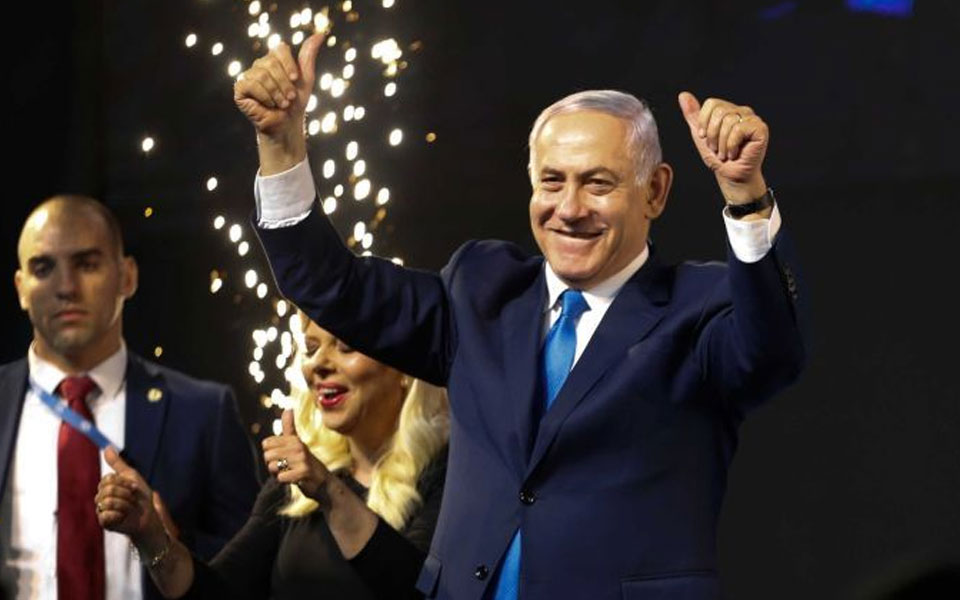Jerusalem: Prime Minister Benjamin Netanyahu sought to form a rightwing governing coalition on Thursday after securing victory in a high-stakes Israeli election despite a strong challenge from a centrist alliance.
The results from Tuesday's vote came despite corruption allegations against the 69-year-old premier and kept him on course to become Israel's longest-serving prime minister later this year.
His close ally President Donald Trump, who has swung US policy sharply in Israel's favour and openly backed Netanyahu, said the incumbent's victory for a fifth mandate gives the White House's long-awaited peace plan a "better chance".
Netanyahu's rightwing Likud party looked set to finish with a similar number of seats in parliament to his main rival, ex-military chief Benny Gantz's centrist Blue and White alliance.
But the results showed that Likud together with other rightwing parties allied to the prime minister would hold around 65 seats in the 120-seat parliament.
Gantz conceded defeat on Wednesday night, and final official results were expected to be announced by Friday.
The results leave President Reuven Rivlin, who must ask one of the candidates to form a government, with little choice but to pick Netanyahu.
Intensive coalition negotiations could drag on for days or even weeks.
Rivlin said he would begin consultations with party heads next week ahead of making his decision.
His office said the consultations would be broadcast live in their entirety for the first time.
The close race between the two main parties had led to uncertainty after polls closed Tuesday night and exit surveys were released.
Both Netanyahu and Gantz claimed victory after the initial exit polls.
"We respect the decision of the people," Gantz told journalists on Wednesday night, acknowledging he had failed to unseat the prime minister.
Former finance minister Yair Lapid, who co-led the Blue and White alliance, vowed to "make life bitter for the Netanyahu government".
Netanyahu spoke in the early hours of Wednesday at the Likud's post-election party in Tel Aviv and called it a "magnificent victory." As he walked onto the stage to chanting crowds, he planted a kiss on the lips of his wife Sara.
"It will be a rightwing government, but I will be prime minister for all," he said.
The vote had been expected to be close, even with Netanyahu facing potential corruption charges.
Fighting for his political life, Netanyahu spent the weeks ahead of the vote campaigning furiously to energise his rightwing base.
The US president -- who earlier tweeted a picture of people waving Trump flags at what he said was a Netanyahu victory celebration -- said he telephoned Netanyahu to offer congratulations.
Other Netanyahu allies including Indian Prime Minister Narendra Modi, Italy's Deputy Prime Minister Matteo Salvini and Austrian Chancellor Sebastian Kurz also offered congratulations.
Gantz, a newcomer to politics, mounted a strong challenge by brandishing his security credentials while pledging to undo damage he says Netanyahu has inflicted on the country with divisive politics.
The election was in many ways a referendum on the premier who has built a reputation as guarantor of the country's security and economic growth, but whose populism and alleged corruption left many ready for change.
He engaged in populist rhetoric that critics said amounted to the demonisation of Arab Israelis and others.
True to form, Netanyahu issued a controversial pledge only three days before the election, saying he planned to annex Jewish settlements in the occupied West Bank should he win.
Extending Israeli sovereignty on a large scale in the West Bank could end already fading hopes for a two-state solution with the Palestinians.
It is a move long championed by Israel's far right.
Netanyahu sought to portray himself as Israel's essential statesman during the campaign and highlighted his bond with Trump.
Let the Truth be known. If you read VB and like VB, please be a VB Supporter and Help us deliver the Truth to one and all.
Udupi: Manju Kola, husband of former Udupi City Municipal Council Vice-President Lakshmi Manjunath and a Hindutva organisation leader, was stabbed during a meeting held to settle a dispute related to a love affair at Malpe on Tuesday night.
Police have arrested five accused in connection with the case.
According to information available, Manju Kola had reportedly called for a compromise meeting near Malpe beach in the Palimaru area on Tuesday evening to resolve an issue involving a couple. During the discussion, a heated argument broke out and a youth allegedly stabbed Manju Kola.
He sustained injuries to his abdomen and collapsed. He was immediately shifted to a private hospital in Udupi for treatment.
Udupi Superintendent of Police Hariram Shankar said that five accused have been arrested in the case. As per preliminary investigation, the incident appears to have occurred due to personal reasons. He clarified that there is no communal angle to the incident and urged the public not to spread rumours.
The injured Manju Kola is out of danger and his condition is stable, the SP said.





